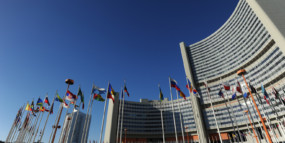Posted on 13 Oct 2022
Use of information and communications technologies for criminal purposes was high on the agenda at the UN General Assembly as the Third Committee debated priority global crime issues.
The United Nations opened its 77th General Assembly in September 2022. During high-level week, where world leaders converge to lay out their top concerns and priorities, climate change and the Russian war in Ukraine loomed large. Leaders from many African countries were united in demanding a greater role in peace and security leadership through a permanent seat on the Security Council.
The Global Initiative Against Transnational Organized Crime attended a number of side events during high-level week focused on topics ranging from extremist violence in cities, to tech and democracy, to civil society and anti-corruption efforts. The GI-TOC also hosted a consultation with member states, UN personnel and civil society. Titled ‘The Future of Organized Crime: Time for a Global Strategy?’, this event presented emerging scenarios for organized crime and gathered expert inputs from the audience.
Third Committee takes on crime
Following high-level week, committees got to work, and on 3 October the Third Committee on Social, Humanitarian & Cultural Issues convened its meeting on crime issues. Spanning topics from gender-based violence to cybercrime, the meeting helps demonstrate priority areas for governments as well as indicate where New York missions are focused at the moment. Some of the focus came from the meeting framing crime, information and technologies, and drugs (relating to multiple UN policy agendas), but governments were free to raise issues of their concern.
While Russia called for governments not to politicize crime and reiterated its commitment to the UN conventions, this meeting occurred less than a week after the annexation of Ukrainian territory and a speech made by President Putin that essentially called into question international law as it stands today. On the other hand, the European Union used the interactive discussion with the UN Office on Drugs and Crime (UNODC) to ask how the war has affected organized crime and what the UNODC is currently doing in the region. Needless to say, cooperation across regional groups remains tense.
Perhaps unsurprisingly, given the ongoing ‘cybercrime’ treaty negotiations, most states spoke on the use of ICT for criminal purposes. Most reiterated the threat posed by technologies and lent support to the Ad Hoc Committee negotiations. Others used the opportunity to reiterate some of their main overriding messages: the European Union (EU) and US, for example, reiterated the need for human rights safeguards; the Bahamas, on behalf of the Caribbean Community (CARICOM), emphasized the relevance of the digital divide in responding to cybercrime and the importance of technical assistance; and India on the inclusion of terrorism as a crime in the proposed treaty.
A key concern raised by many states was human trafficking. Singapore, on behalf of ASEAN, as well as South Africa, Egypt, India, Mexico, Greece and Turkey were among these – a number of them expressing the importance of protecting migrants and addressing trafficking victims’ needs. The need to protect migrants was raised both in the context of protection from traffickers and from their being instrumentalized for political purposes. The EU raised the issue of human trafficking – especially of women and children – in relation to Ukraine. Indonesia focused on the links between illegal fishing and trafficking; Spain and Guatemala said they would introduce a resolution to address crimes against trafficking of human organs, cells and tissues – which would be a third attempt to advance such a resolution.
Latin American and Caribbean countries highlighted the illegal weapons trade, its damaging impacts and its link to business practices across regions. The Bahamas, on behalf of CARICOM, drew attention to the high levels of gun-related violence linked to firearms smuggled in from outside the region, reminding the committee they are not the manufacturers of firearms causing violence to surge in the Caribbean. This statement was echoed by Mexico, who drew attention to the links between violence, organized crime, and the manufacture and distribution of firearms, claiming companies should not be let off the hook for the impacts of their activities. Meanwhile, Jamaica called for a ‘war on guns’. Later in October, the First Committee on Disarmament and International Security will also take up the issue of illicit trade in small arms and light weapons.
On drug policy, polarized points of view again prevailed. On the one hand, the Bahamas called for flexibility in crafting drug policies according to national development plans; Mexico asked to move from eradication to prevention. On the other, Singapore, speaking on behalf of ASEAN, noted its intention of a drug-free ASEAN; while Zambia declared that ‘calls for decriminalization and legalization of illicit drugs such as cannabis’ go against the drug conventions. Others underscored the harms caused by drug trafficking networks, or supported alternative livelihoods programmes and government responses to treatment of people who use drugs (which in reality still ranges from compulsory and akin to imprisonment to optional treatment). The airtime given to treatment and rehabilitation from countries including Saudi Arabia, Iran, and Malaysia reflects a sea change over the past several years that responses must include public health efforts. States will continue to discuss drug policy as they advance the annual Omnibus Resolution at the UN in New York later in October and November.
The discussions around crime were not limited to these areas: states also raised corruption, gender-based violence and other critical topics. Cybercrime stood out as the priority issue, however, due to ongoing treaty negotiations, with many states reinforcing points made during those convenings. These debates will be taken up again in January 2023 in Vienna. For now, in New York, delegates will continue to set out priorities for crime-related agendas as committee sessions continue, both in the First and Third Committees.



